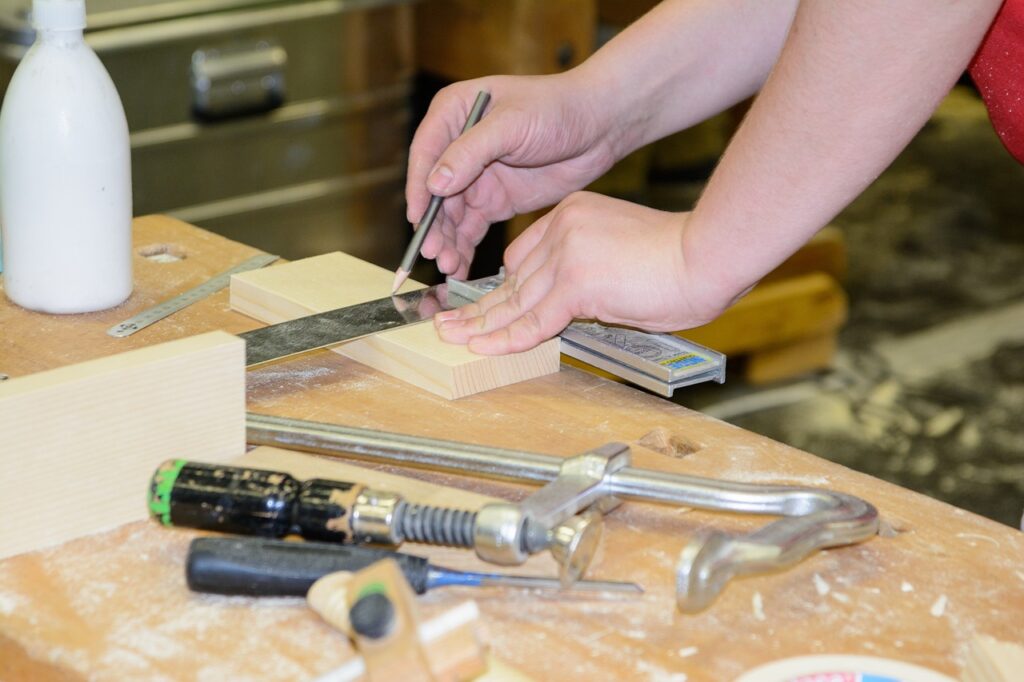Obtaining a carpenter license is a crucial step for anyone pursuing a career in carpentry. Not only does it demonstrate your commitment to the profession, but it also comes with a variety of benefits, such as increased job opportunities, credibility, and earning potential. This blog will provide you with a comprehensive guide on the path to becoming a licensed carpenter.
Understanding Carpenter License Requirements
Before diving into the process of obtaining a carpenter license, it is essential to understand the basic requirements and any state-specific regulations. Let’s explore these prerequisites.
Basic Requirements for a Carpenter License
First and foremost, age and education play a significant role in qualifying for a carpenter license. Typically, applicants must be at least 18 years old and have a high school diploma or equivalent. Some states may have additional educational requirements.
Experience and training are also vital components of the licensing process. Prospective carpenters should expect to complete an apprenticeship or training program and gain hands-on experience in the field. The duration and specifics of these programs may vary depending on location and the individual’s background.
State-Specific Requirements
It’s important to note that licensing requirements can differ from state to state. For example, some states mandate specific exams, while others have unique education and experience prerequisites, and some may not require any type of license or certification. Additionally, certain states may have reciprocity agreements, allowing licensed carpenters to work in multiple states without obtaining a separate license for each.
Given the variance in regulations, it is essential to research local requirements before embarking on the licensing journey. This due diligence will ensure that you meet all necessary qualifications and avoid any surprises during the application process.

Steps to Obtain a Carpenter License
Once you have a clear understanding of the requirements, it’s time to start working towards your carpenter license. This section outlines the necessary steps to achieve your goal.
Complete an Apprenticeship or Training Program
Various apprenticeship and carpenter programs exist to help aspiring carpenters gain the skills and knowledge needed for licensure. These programs may be offered through trade schools, community colleges, or local carpenters’ unions. To find a suitable program, you can conduct online research, consult with local carpenters, or reach out to trade schools and unions directly.
After finding a program that aligns with your goals, you will need to apply and enroll. Keep in mind that admission requirements and deadlines may vary, so it’s crucial to prepare and plan accordingly.
Gain Work Experience
Hands-on experience is a crucial component of the licensing process. One way to obtain entry-level carpentry jobs is by networking with experienced carpenters or joining local trade organizations. Job search websites and local classifieds can also be valuable resources for finding opportunities.
Additionally, mentorship can be an invaluable asset in gaining experience. Building relationships with seasoned carpenters can provide guidance, support, and practical insights into the industry.
Prepare for and Pass the Licensing Exam
Licensing exams typically cover a wide range of topics, such as carpentry techniques, building codes, and safety practices. The exam format may vary depending on your state, but often includes multiple-choice questions.
To prepare, consider using study guides, online resources, or exam prep courses. These materials can help you familiarize yourself with the exam content and format, as well as provide practice questions to test your knowledge. Additionally, don’t underestimate the power of a consistent study schedule and a focused approach.
Complete the License Application Process
Once you have successfully passed the licensing exam, you will need to complete the application process. This typically involves submitting required documentation, such as proof of education, experience, and exam results. You may also need to pay application and licensing fees.
Be prepared for the processing time, which can vary depending on your state’s licensing board. Once your application is approved, you will receive your carpenter license and be ready to embark on your professional journey.
Maintaining and Renewing Your Carpenter License
Obtaining a carpenter license is just the beginning. To ensure ongoing success in your career, it’s essential to maintain and renew your license as required. This section discusses continuing education and the renewal process.
Continuing Education Requirements
Staying updated on industry trends and techniques is crucial for professional growth and maintaining your carpenter license (where applicable). Many states require carpenters to complete continuing education courses to ensure they remain knowledgeable and skilled in their field.
Various courses and resources are available to fulfill these requirements, such as online classes, workshops, and seminars. Topics may include new construction methods, advancements in building materials, and updates to building codes. In addition to meeting renewal requirements, these courses can also enhance your skills and increase your value to employers and clients.
License Renewal Process
The frequency at which you need to renew your carpenter license depends on your state’s regulations. Some states require renewal every two years, while others may have different timelines. Be sure to familiarize yourself with your state’s renewal process and deadlines to avoid any lapses in licensure.
To renew your license, you may need to submit an application, provide proof of completed continuing education courses, and pay a renewal fee. Keeping track of your completed courses, maintaining accurate records, and staying organized will make the renewal process smoother and more manageable.

Advancing Your Career as a Licensed Carpenter
As a licensed carpenter, the possibilities for career advancement are abundant. By pursuing specialized certifications and engaging in networking opportunities, you can further your skills and expand your professional horizons.
Pursuing Specialized Certifications and Credentials
Specialized certifications and credentials can help you stand out in the carpentry field. Examples of specialized areas include green building, historic restoration, and custom woodworking. By obtaining additional certifications, you can showcase your expertise and dedication to your craft, potentially leading to new job opportunities and increased earning potential.
Research the certification options available in your area of interest, and consider pursuing those that align with your career goals. Keep in mind that additional training and exams may be required to obtain these certifications.
Networking and Professional Development Opportunities
Networking is essential for career advancement. By joining carpentry associations and organizations, you can connect with like-minded professionals, exchange ideas, and gain access to valuable resources. These organizations may offer exclusive job postings, industry updates, and discounts on continuing education courses.
Attending conferences and workshops is another excellent way to network and expand your knowledge. These events often feature guest speakers, panel discussions, and hands-on workshops, providing opportunities to learn new techniques, gain insights into industry trends, and make valuable connections.
Conclusion
Obtaining a carpenter license is essential for those looking to pursue a rewarding career in the carpentry field. With a license in hand, you can enjoy increased job opportunities, credibility, and earning potential. Don’t forget the wealth of resources and support available to you as an aspiring carpenter, from apprenticeship programs to networking events and continuing education courses.
As you embark on this journey, remember that your dedication to learning and growth will be the foundation for a successful career. We wish you the best of luck in your endeavors and encourage you to take advantage of the guidance and assistance provided by our website, as we strive to support adult learners and non-traditional students in achieving their career goals.

FAQ About Carpenter Licensure
What is carpenter licensure?
Carpenter licensure is the process by which carpenters obtain official approval from regulatory authorities to legally practice their trade. It often involves meeting certain education, experience, and examination requirements.
Why do carpenters need to be licensed?
Licensure ensures that carpenters have the necessary skills, knowledge, and experience to perform their work safely and effectively. It also helps protect consumers by setting standards for professionalism and quality.
What is the difference between a carpenter license and certification?
Licensing is typically a government-regulated process that grants legal permission to practice carpentry. Certification, on the other hand, is often a voluntary process that signifies a carpenter has met specific industry standards but may not be a legal requirement.
Do Carpenters need surety bonds to become licensed?
Whether carpenters need surety bonds can depend on various factors such as local regulations, the type of work they are involved in, and specific project requirements. Surety bonds are often required in construction projects to provide financial protection and assurance that the work will be completed as agreed upon.
Here are some scenarios where carpenters may need surety bonds:
Contractual Obligations: If a carpenter enters into a contract for a construction project, the project owner or general contractor may require a surety bond. This bond ensures that the carpenter will fulfill the terms of the contract, and if they fail to do so, the bond can be used to compensate the project owner for any financial loss.
Licensing Requirements: In some jurisdictions, carpenters may need to obtain a license to operate legally. As part of the licensing process, a surety bond may be required to demonstrate financial responsibility and compliance with industry regulations.
Performance Bonds: Carpenters working on larger construction projects may be required to provide performance bonds. These bonds guarantee that the carpenter will complete the work according to the specifications outlined in the contract.
Carpenters should check local regulations and project requirements to determine whether surety bonds are necessary for their specific situation. If the carpenter is working as a subcontractor, the general contractor or project owner will typically specify the bonding requirements in the contract.
Keep in mind that surety bonds are a form of risk management and can vary in terms of cost and coverage. Carpenters may need to work with a surety bond provider to obtain the appropriate bond for their needs.
Licensing Resources for Carpenters
Contractor Training Center: https://contractortrainingcenter.com/
Carpenters of America: https://www.carpenters.org/
National Association of Home Builders: https://www.nahb.org/
